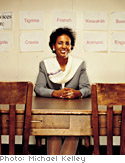Phenomenal Woman: The Escape Artist

She fled an abusive arranged marriage, a brutal
African prison and a perilous refugee camp. Now Nikki Tesfai dedicates her life
to helping the displaced and discouraged—52,000 of them so far—find homes and
hope.
It's 11 o'clock on a Friday morning in Los Angeles, and Nikki Tesfai has an hour to find beds for a Somali woman and her three small children, newly arrived in America and penniless. "Shelters close their lists each day at noon, and she has nowhere else to go tonight," Tesfai explains to the small crowd in her office between urgent telephone calls. "This woman trusted a man who then took all her money. It happens all the time."As usual, the 47-year-old founder and executive director of the African Community Resource Center is doing three things at once. She and a colleague are designing a program that will sensitize members of the Los Angeles Police Department to the special needs of African refugee women who've suffered domestic violence. A realtor has just stopped by to show her a property that might serve as a second shelter for these women and their children. (Last January she opened the first American shelter for African refugee women and children, though others are welcome, too. It already houses 20 to 25 people, with 16 more on the waiting list.) And I'm there to interview her when she has a free moment, which doesn't seem likely.
It's difficult for me to remember that this elegant and serene woman was once a prisoner of war and a desperate refugee herself. Born in Eritrea and raised in Ethiopia, neighboring East African nations often at war, Tesfai knows flight and danger in her bones. She also knows how to transform suffering into compassionate action.
Since 1984, the African Community Resource Center (ACRC) has offered more than 52,000 refugees and immigrants from 52 countries the skills and support they need to start new lives. The ACRC makes sure that newcomers to America have access to health care, counseling, education, job training, temporary housing and legal aid. Thirty to forty clients a day—double that on Wednesdays, when the food bank is open—come to the ACRC's modest but welcoming headquarters, decorated with bright Senegalese fabrics and Cameroonian dolls. Most of the visitors are African, but there are also plenty from Europe, Asia, and South America. "The feeling is the same whether you are Asian, Latino or African," Tesfai says. "You've been uprooted from home. You feel lonely, disoriented, scared, you lose your whole self, all your tradition and you need a support system." Drop in on the ACRC and you're likely to find a dozen people sitting around a wooden table chatting happily in French, English, Amharic—an Ethiopian language—and ten other tongues, as if the office were a social club.



